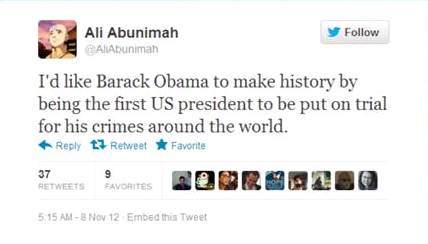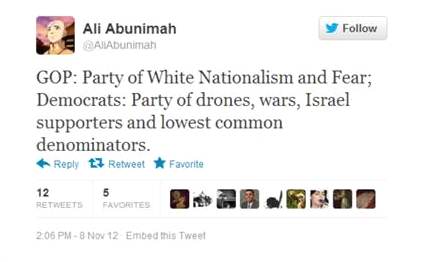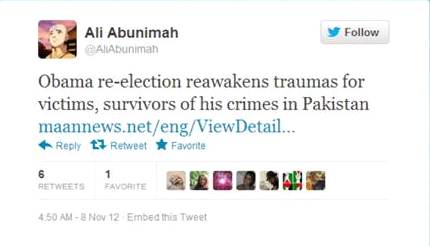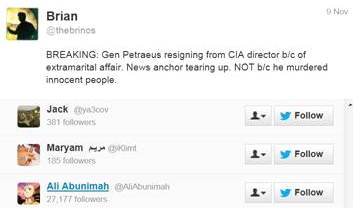Ali Abunimah hopes Obama will make history [updated]
No, the title of this post doesn’t mean that Ali Abunimah of the Electronic Intifada hopes President Obama will achieve an Israeli-Palestinian peace agreement in his second term. After all, like most “pro-Palestinian” activists, Abunimah is not primarily interested in the establishment of a Palestinian state, but rather in getting rid of the Jewish State.
Yet, as much as so-called pro-Palestinian activists may hate Israel, they often also have plenty of other resentments that add up to an utterly unhinged world view. There is perhaps no better way to examine the fringe views that are so popular in “pro-Palestinian” circles than to follow Ali Abunimah on Twitter.
Consider this recent tweet by Abunimah:
To be sure, once upon a time, Abunimah had a much more favorable view of Obama – but that was of course when Obama would “attend events in the Palestinian community in Chicago all the time.”
By now, Abunimah seems thoroughly disenchanted, not just with Barack Obama, but even with the Democratic Party in general:
It is noteworthy that in this tweet, support for Israel ranks only third in the list of Democratic faults.
That is because Abunimah was also tweeting a Reuters report published by the Palestinian Ma’an News Agency that described how some Pakistanis reacted to Obama’s re-election.
Of course, Ali Abunimah doesn’t usually care all that much what’s going on in Pakistan, and he certainly wouldn’t like it if people started to compare all the attention the Palestinians are getting to the disgraceful neglect of the Baloch struggle against Pakistan’s murderous oppression of their aspirations for freedom.
However, Abunimah’s concern for Pakistani victims of American drone strikes is apparently due to his view that both the US and Israel should be condemned for fighting against Islamist terrorism. It was therefore hardly a surprise when Abunimah retweeted a complaint that General Petraeus had resigned because of an extramarital affair, and not because “he murdered innocent people.”
Elaborating on this issue at the Electronic Intifada, Abunimah not only reminded his readers that Petraeus once made a controversial remark blaming the unresolved Israeli-Palestinian conflict for fuelling the flames of Arab hatred for America, but also claimed that this remark was motivated by “the same cold calculation of how to maintain and advance US imperial domination that allowed him [Petraeus] to oversee – on behalf of the president – wars, occupations and murders of children and teenagers and other civilians all over the world using drones.”
So in the world of Ali Abunimah and his many fans, the US president and the generals who serve in the US army are all just murderers and criminals.
Needless to say, this is even more true when it comes to Israel. Here is Ali Abunimah’s take on the recent aggression from Hamas-ruled Gaza:
Amazingly, there are still people who apparently think Abunimah should somehow be taken seriously. Last March, The Forward published a fairly sympathetic profile of him, which concluded with the remark that Abunimah feels that the criticism he gets proves that people “are paying attention” to him. The Forward profile ended by quoting Abunimah:
“I am not a professor at a big university. I don’t have a think tank behind me. I don’t have a title, and yet I am able to influence in one way or another the way people think and the way that they act […] As much as the opposition would like to ignore me, they can’t, and that is not because of any title I carry.”
Well, with all this influence Abunimah fancies himself having, Obama has already one leg in prison… Of course, there may be severe overcrowding, since most US generals should probably also be there, and let’s not forget George W. Bush and all Israeli leaders and generals and whoever else isn’t in favor of the glorious “resistance” put up by Islamist terrorists in the Middle East and elsewhere.
* * *
This is a belated cross-posted from my JPost blog.
UPDATE:
In response to this post, G-Nice@ArikSharon alerted me to an interesting piece written by the widely respected Palestinian* commentator Hussein Ibish a few years ago. Under the title “What does Ali Abunimah really believe?,” Ibish notes that he and Abunimah wrote “numerous articles and monographs” together, but that Abunimah’s views “have shifted radically in recent years.” Ibish also points out something I’ve often noticed when reading Abunimah’s output: namely, that he “tailors his statements to appeal to different audiences in different media at different times” – which perhaps indicates that he is aware that openly standing by the unhinged views with which he fires up his fans would come with the price of not being taken serious by a less partisan audience.
Needless to say, I fully agree with Ibish’s view that “its not really possible to fully understand what Abunimah’s real thinking is without consulting [his] tweets in which he has been letting his guard down and allowing those who pay attention to get a close glimpse of his actual agenda, which is decidedly not a pretty picture.”
But since Ibish uses the term “agenda,” it’s worth highlighting that Abunimah combines his enthusiastic cheerleading for Hamas and Islamic Jihad with a relentless demonization of Israel, passing it off not only as “pro-Palestinian”, but also as a progressive defense of human rights.
This is of course exactly the kind of “pro-Palestinian” activism that has done so much to poison progressive politics.
Whether or not Abunimah’s activism can be described as “pro-Palestinian,” it sure qualifies as obsessively anti-Israel. Yet, as Palestinian President Mahmoud Abbas has demonstrated with his recent speech at the UN to much applause, it indeed seems that championing the “Palestinian cause” is generally understood as requiring harsh denunciations of Israel.
But it is too often overlooked that the most fervent anti-Israel ideologues show symptoms that are hard to distinguish from those that Walter Russell Mead hasrepeatedly described so well for antisemitism. As Mead put it:
“Jew haters don’t understand how the world works; anti-Semitism is both a cause and a consequence of a basic failure to comprehend the way pluralistic and liberal societies behave. As a result, nations and political establishments warped by this hatred tend to make one dumb decision after another.”
Those who are consumed by hate for the world’s only Jewish state and dedicate themselves single-mindedly to the goal of undoing its establishment tend to exhibit similar failures of comprehension – which is arguably no coincidence given the often observed overlap between anti-Zionism and antisemitism.
But as Mead rightly noted in a post on “The Hate That Dares Not Speak Its Name,” “many of today’s anti-Semites like to think of themselves as enlightened, modern people and [they] get all huffy and hissy if anyone accuses them of prejudice in any form.”
This is certainly true for Ali Abunimah and many of his fellow activists and followers. Yet, while Abunimah has repeatedly tried to distance himself from activists who propagated antisemitic tropes all too openly, there is no denying that the politics of the supposedly “progressive” down-with-Israel crowd differs very little from the hate-filled visions of antisemites.
As hard as Abunimah may try to pose as a progressive anti-racist and defender of human rights, his enthusiastic cheerleading for Hamas and groups like Islamic Jihad ultimately means going along with the seething Jew-hatred expressed in the Hamas Charter and in countless jihadi pronouncements.
But there is arguably more to it, because – as I tried to illustrate by highlighting Abunimah’s views on Obama – dedicated anti-Israel activists like Abunimah tend to have radical fringe-views not only on Israel, but also on many other issues. Perhaps unsurprisingly, the down-with-Israel-crowd also hates a lot about America and the West in general – and this hate is so all-consuming that there seems to be little else.
Those who happily subscribe to these fervent resentments will therefore usually be unable or unwilling to see the Middle East and the Muslim world as anything but victims of Western depravity. Whatever might be wrong there is not deemed worthy of attention given the enormity of Western wrong-doing.
To be sure, this version of “The White Man’s Burden” has long been a widely accepted part of the supposedly progressive world view that elevates the “Palestinian cause” to the all-important issue of our time. While the latent antisemitism that is so frequently an integral part of this “progressive” activism certainly helps to explain some of the bizarre positions that are so enthusiastically embraced by “pro-Palestinian” campaigners, it is also very interesting to look at this as a broader manifestation of the Zeitgeist. Some of the writings by Richard Landes are particularly interesting in this context. He has coined the term “Masochistic Omnipotence Syndrome,” arguing:
“Without self-criticism and its accompanying learning curve, there is little progress. Hence progressives rightly emphasize self-criticism. […] In some cases, however, self-critical progressives can take this strategy so far that they fall into the trap of taking most or all of the responsibility for something when it is not primarily of their doing. To some extent, this unusual generosity reflects the notion that it takes a “big man” to admit fault, and that if we progressives are stronger, we should make the first, second and even third moves of concession and apology, in order to encourage those with whom we find ourselves in dispute. Combining inflated rhetoric with a therapeutic notion that the disadvantaged should not be held to the same exacting standards (moral equivalence) leads one to fall into self-critical pathologies.
In the most extreme cases, we encounter Masochistic Omnipotence Syndrome (MOS): “it is all our fault; and if we can only be better, we can fix anything/everything.” This hyper-critical attitude can be seen with particular clarity in the response of some progressives and radicals to both the 9-11 attack in 2001 in the US, and the 7-7 attack in 2005 in London. For many, “What did we do to make them hate us?” trumped “What are they telling themselves that makes them hate us so?” In a sense, the very preference for the former question underlines our desire to be in control. Maybe we can fix what it is that we do to them, so they’ll not hate us so. Maybe even, they’ll like us. […]
The tendency to hyper-self-criticize leads to a kind of moral self-absorption in which one loses any sense of the other side of any conflict as moral agent. […] the real tragedy here comes with the unconscious racism involved in such a moral argument. The proponents of such thinking fail to grant the “other side” any moral agency. “Their behavior is entirely reactive, a response to our bad deeds. If only we would stop, they would stop.” This approach, which gives us, among other things, the current policy of appeasement in the West, also operates on assumptions that the “other” — in this case, the global Jihadis and the Muslim cultures from which they draw their recruits — are not autonomous moral agents. In other words, they, like animals, can’t help themselves. Hence, we make no moral demands on them, indeed, we lower ourselves to their moral level with our equivalences.”
* * *
*Correction: Somebody on Twitter protested my description of Ibish as Palestinian, and indeed it seems I was mistaken. There is only very little information on Ibish’s family background available, but a 2003 obituary of his father, Professor Yusuf Hussein Ibish, indicates that he came from a Syrian-Kurdish family while his mother Joan Schenck was apparently European or American.
http://warped-mirror.com/2012/12/08/ali-abunimah-hopes-obama-will-make-history-updated/






No comments:
Post a Comment